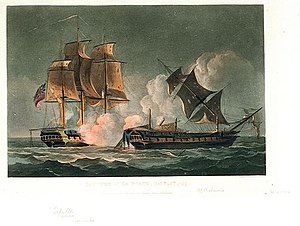| Action of 28 February 1799 | |||||||
|---|---|---|---|---|---|---|---|
| Part of the French Revolutionary Wars | |||||||
 Capture of La Forte, Feb 28th 1799, Thomas Whitcombe | |||||||
| |||||||
| Belligerents | |||||||
|
|
| ||||||
| Commanders and leaders | |||||||
|
|
| ||||||
| Strength | |||||||
| 1 frigate | 1 frigate | ||||||
| Casualties and losses | |||||||
|
6 killed 16 wounded |
65 killed 80 wounded 1 frigate captured | ||||||
The action of 28 February 1799 was a minor naval engagement of the French Revolutionary Wars, fought off the mouth of the Hooghly River in the Bay of Bengal between the French frigate Forte and the Royal Navy frigate HMS Sybille. Forte was an exceptionally large and powerful ship engaged on a commerce raiding operation against British merchant shipping off the port of Calcutta in British India. To eliminate this threat, Sybille was sent from Madras in pursuit. Acting on information from released prisoners, Edward Cooke, captain of Sybille, was sailing off Balasore when distant gunfire alerted him to the presence of Forte on the evening of 28 February. The French frigate was discovered at anchor in the sandbanks at the mouth of the Hooghly with two recently captured British merchant ships.
For unclear reasons the French captain Hubert Le Loup de Beaulieu did not properly prepare Forte to receive the attack from Cooke's frigate and he was consequently killed in the first raking broadside from the British ship. Forte's crew continued to resist for more than two hours, only surrendering when their ship had been reduced to a battered wreck and more than a third of the crew killed or wounded. British losses by contrast were light, although Cooke had been struck by grape shot during the height of the action and suffered a lingering death three months later from his wounds. The captured merchant ships subsequently escaped under their French prize crews while Cooke's executive officer Lieutenant Lucius Hardyman repaired Sybille and Forte. Hardyman took both ships into Calcutta, where Forte was commissioned into the Royal Navy under the same name, although the frigate was accidentally wrecked in the Red Sea two years later.
